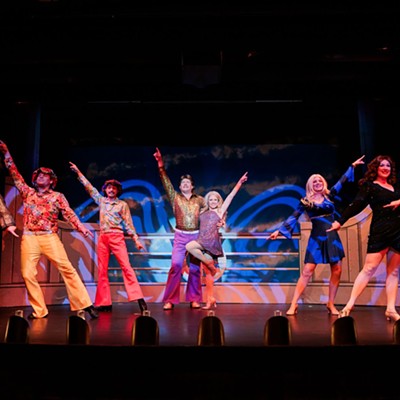Because, 140 years after the feat, we are accustomed to split-second communication and jet travel, Around the World in 80 Days sounds like it could be the title of a disaster film.
But in 1872, Jules Verne's tale of a globetrotting challenge to be completed in a scant 80 days was a laughable impossibility. So improbable was such an attempt judged to be that a wager of 20,000 pounds between Phileas Fogg and his compadres at the Reform Club was made without much discussion at all. Within minutes Fogg and his brand-new valet were off on an adventure of global proportions.
Verne's tale has been adapted for the theater by Mark Brown and Arizona Theatre Company is offering us an opportunity to go along for the ride. What fun, right?
Well, sort of.
There are quite a few entertaining elements in the David P. Saar-directed show, most of which have to do with a wonderfully game cast of five who bring us about 40 distinctively different characters in split-second transformations. Their talent and skill help keep us in the adventure, but they have to drag around such a ponderous production style that after a first act that runs almost an hour and a half, we begin to wonder if we are to spend 80 days in our seats. And, if so, will meals be provided?
This is a story that should be suited perfectly for the stage, with its inherent opportunities for clever invention and playfulness. And, in fact, there are numerous clever inventions on display, made possible by some fine design and engineering. Carey Wong's set, Gregory W. Towle's projections, David Lee Cuthbert's lighting design and Karen Ledger's costumes all contribute to a sense of the places and sights and situations encountered by our travelers. But there is such a sense of constraint in how all of these inventions manifest that we lose a sense of play. What a shame.
So we travel to Egypt, Calcutta, Bombay, Hong Kong, San Francisco and New York, where Phileas Fogg (Mark Anders) and his French manservant Passepartout (Jon Gentry), encounter oh-so-many difficulties: missed trains; ships that have already set to sea; washed-out bridges; a woman about to be burned to death (which doesn't seem at all to be right and requires intervention); and attacks by wild "Indians." They are the usual problems that circling the globe would present in 1872, we must suppose, because there seems to be little surprise or genuine concern that these difficulties might be insurmountable obstacles to winning a small fortune of a bet. For each one, the unflappable Fogg finds a workaround.
Not only are there travel difficulties, but Detective Fix (Bob Sorenson) also has decided that Fogg is clearly the chief suspect in a bank robbery that occurred quite coincidentally with Fogg's hasty departure from London. While Fogg and company are chasing time, Fix is chasing Fogg.
Frankly, there are some inherent difficulties with this story that could not be countered in ATC's production. The first is the actual character of Fogg. A more phlegmatic character would be hard to imagine. He keeps to a schedule obsessively, and to himself mostly, except for the cool-ish mingling with the crew he encounters at the Reform Club. He has fired his manservant because the unfortunate man presented Fogg with water for shaving that registered 84 degrees when it should have been 86. Does this seem like a man who could be nonplussed by the inevitable challenges of travel?
And although he is not unkind and has, in fact, proved to be quite generous, he's not the kind of character we wish to care about, identify with and root for. That's an unattractive emotional distance for a main character in whom we want and need to invest our energies and wits. In short, he isn't all that likable. This is the character that Verne created, and Anders' interpretation is true. And problematic.
There's another tricky component with Fogg. He is a man of some wealth, and each time an obstacle is encountered, he whips out his wallet and throws money at it. Where's the fun, the invention, the character in that?
Fogg's coolness is countered to a degree by the wonderfully winning personality of Passepartout, rendered here quite playfully by Gentry. A devoted servant to Fogg, it is he who is really our spirited travel guide, who advocates for Fogg and does his best to make everything work while, of course, he himself becomes entangled in various mishaps. Without Gentry, along with wonderful multiple characterizations by Kyle Sorrell and Yolanda London, the adventure would be humorless and really quite unbearable.
Pacing-wise, there is very little sense that this is a race against the clock, that the stakes are high and that these truths might induce an ever-increasing haste. There are funny moments, and there is evidence of what a goodly sum of money in the hands of theater professionals can produce. But there's little sense of delight that these things can be so. The materialization of an elephant is fun, in a cute sort of way, and a boat sloshing around in a typhoon is a pleasing moment. But it's all so well put together that although it may look professional, it's not playful.
This is perhaps more surprising because Saar founded and continues to run the well-respected Childsplay theater in Tempe. What happened?
Unfortunately, what should be Mr. Toad's Wild Ride is more like a modest whirl in a teacup at the not-really-so-Mad Tea Party. Despite some fine performances, this trip around the world is a bit of fun, but mostly ho-hum.








